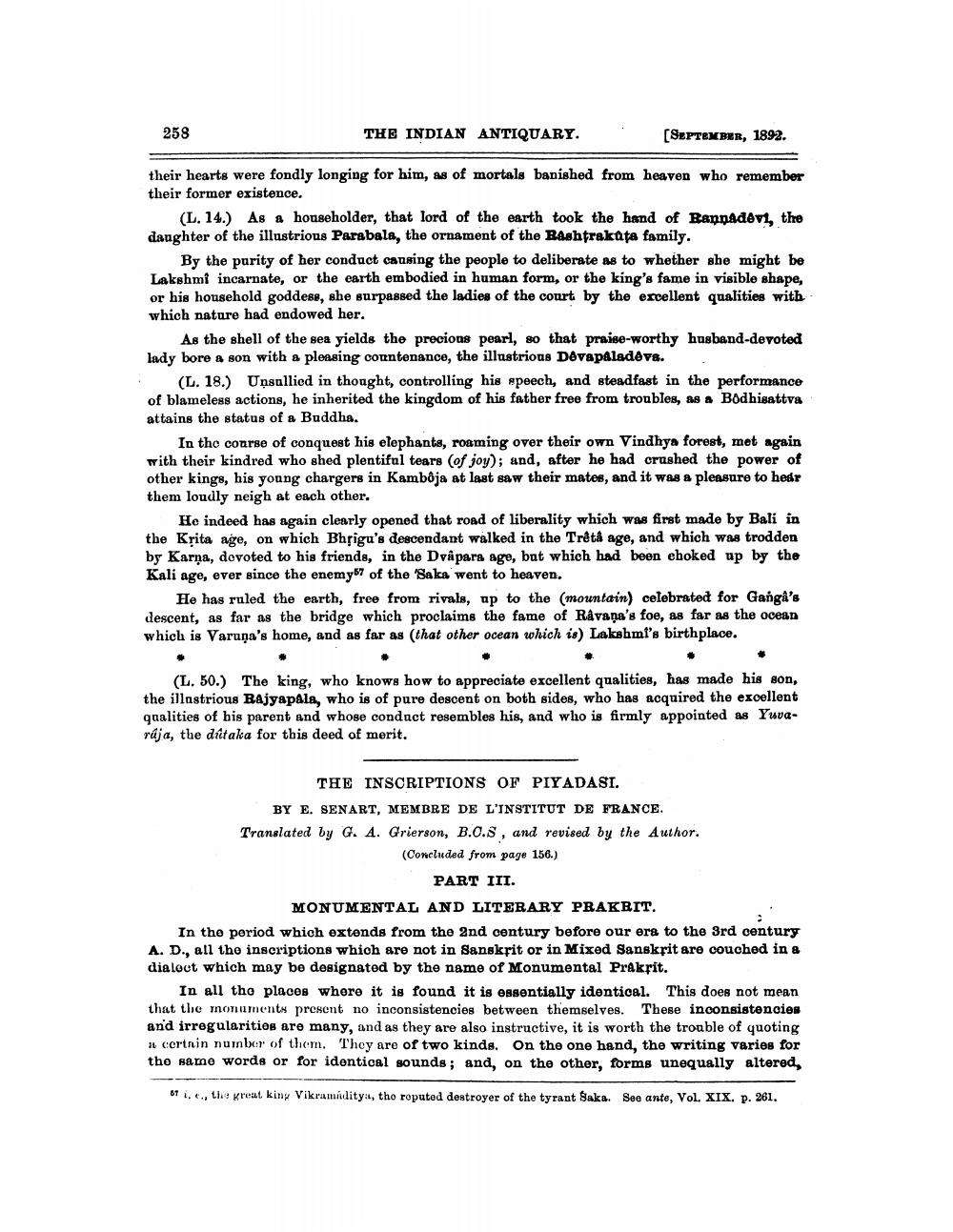________________
258
THE INDIAN ANTIQUARY.
(SEPTEMBER, 1892.
their hearts were fondly longing for him, as of mortals banished from heaven who remember their former existence.
(L. 14.) As a householder, that lord of the earth took the hand of Bannadevi, the daughter of the illustrious Parabala, the ornament of the Rashtrakata family.
By the purity of her conduct causing the people to deliberate as to whether she might be Lakshmi incarnate, or the earth embodied in human form, or the king's fame in visible shape, or his household goddess, she surpassed the ladies of the court by the excellent qualities with which nature had endowed her.
As the shell of the sea yields the precious pearl, so that praise-worthy husband-devoted lady bore a son with a pleasing countenance, the illustrious Dovapaladdva.
(L. 18.) Unsullied in thonght, controlling his speech, and steadfast in the performance of blameless actions, he inherited the kingdom of his father free from troubles, as a Bodhisattva attains the status of a Buddha.
In the course of conquest his elephants, roaming over their own Vindhya forest, met again with their kindred who shed plentiful tears (of joy); and, after he had crashed the power of other kings, his young chargers in Kamboja at last saw their mates, and it was a pleasure to hear them loudly neigh at each other.
He indeed has again clearly opened that road of liberality which was first made by Bali in the Krita age, on which Bhrigu's descendant walked in the Trêtå age, and which was trodden by Karņa, dovoted to his friends, in the Dvå para age, but which had been choked up by the Kali age, ever since the enemy67 of the 'Saka went to heaven.
He has ruled the earth, free from rivals, ap to the mountain) celebrated for Ganga's descent, as far as the bridge which proclaims the fame of Råvana's foe, as far as the ocean which is Varuņa's home, and as far as that other ocean which 18) Lakshmi's birthplace.
.
(L. 50.) The king, who knows how to appreciate excellent qualities, has made his son, the illustrious Bajyapala, who is of pure descent on both sides, who has acquired the excellent qualities of his parent and whose conduct resembles his, and who is firmly appointed as Yuvarája, the ditaka for this deed of merit.
THE INSCRIPTIONS OF PIYADASI. BY E. SENART, MEMBRE DE L'INSTITUT DE FRANCE. Translated by G. A. Grierson, B.O.S , and revised by the Author.
(Concluded from page 156.)
PART III. MONUMENTAL AND LITERARY PRAKRIT. In the period which extends from the 2nd century before our era to the 3rd century A. D., all the inscriptions which are not in Sanskrit or in Mixed Sanskrit are couched in a dialect which may be designated by the name of Monumental Prakrit.
In all the places where it is found it is essentially identical. This does not mean that the monuments present no inconsistencies between themselves. These inconsistencies and irregularities are many, and as they are also instructive, it is worth the trouble of quoting a certain number of them. They are of two kinds. On the one hand, the writing varies for the same words or for identical sounds; and, on the other, forms unequally altered,
61
.. the kreut kiny Vikramidity:, tho roputod destroyer of the tyrant Baka. See ante, Vol. XIX. p. 261.




